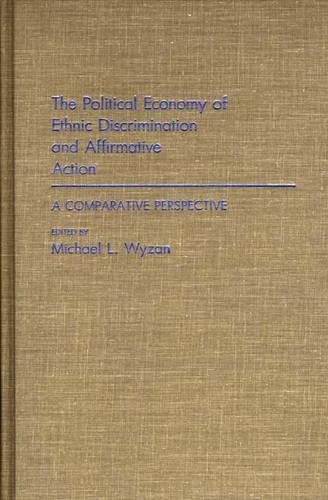
The Political Economy of Ethnic Discrimination and Affirmative Action: A Comparative Perspective
(Hardback)
Publishing Details
The Political Economy of Ethnic Discrimination and Affirmative Action: A Comparative Perspective
By (Author) Michael L. Wyzan
Bloomsbury Publishing PLC
Praeger Publishers Inc
19th October 1990
United States
Classifications
Tertiary Education
Non Fiction
331.133
Physical Properties
Hardback
288
Description
The nine essays collected here examine ethnic relations, discrimination, and affirmative action in different regions of the world. The contributors focus throughout on the political economy of ethnic relations - an area that has until now been largely neglected in the literature. Written by economists, the papers both offer theoretical and empirical insights into standard neoclassical models of discrimination and explore in depth the historical and institutional features of the specific cases under study. Six of the papers address discrimination and affirmative action in developing countries; the remaining essays examine the problem as it has been manifested in socialist states. The aim throughout is to offer the reader an enhanced understanding of the economic and political genesis of the often catastrophic problems associated with ethnic discrimination. Following a general introduction by the editor, the contributors examine relations between Arabs and Jews in the Israeli labor force; the complex interactions between human rights, affirmative action, and land reform in Latin America; and ethnic relations and the new economic policy in Malaysia. The three additional studies of ethnic problems in developing countries look at apartheid in South Africa, political and economic discrimination in Sri Lanka, and ethnic conflict in the Sudan. Turning to an examination of ethnic discrimination under communism, the contributors analyze the problems faced by gypsies in Eastern Europe, the politics of ethnicity and affirmative action in the Soviet Union, and labor market discrimination and ethnic tension in Yugoslavia. A bibliography is included for those wishing to pursue further research on the subject. By focusing attention on discrimination in regions of the world little studied in past works on ethnic conflict, these essays represent a unique and important contribution to the literature of international economics and political economy.
Reviews
Complementing books that focus on the US, this collection of nine essays considers ethnic discrimination and affirmative action in developing industrial and socialist countries (Israel, Malaysia, South Africa, Sri Lanka, Sudan, the western and southern republics of the Soviet Union, Yugoslavia, several countries in Latin America, and more specifically, the Gypsies in Eastern Europe). Written and edited by economists and a political scientist, the volume contains several papers originally presented at a 1987 American Economics Association annual meeting. Typically, contributors discuss the history of the treatment of ethnic minorities, the effects of the political system on them, and their economic status. The papers on South Africa and Yugoslavia contain technical economic models that may not be readily understandable to a general audience. The paper on South Africa discusses the history and effectiveness of economic sanctions on battling apartheid, in addition to presenting several analytical models. The contribution on the Soviet Union compares anti-Semitism in the various republics, using data from a survey of emigres conducted by the author. Figures, tables, and an extensive bibliography. Highly recommended as part of a complete collection on the economic aspects of discrimination.-Choice
"Complementing books that focus on the US, this collection of nine essays considers ethnic discrimination and affirmative action in developing industrial and socialist countries (Israel, Malaysia, South Africa, Sri Lanka, Sudan, the western and southern republics of the Soviet Union, Yugoslavia, several countries in Latin America, and more specifically, the Gypsies in Eastern Europe). Written and edited by economists and a political scientist, the volume contains several papers originally presented at a 1987 American Economics Association annual meeting. Typically, contributors discuss the history of the treatment of ethnic minorities, the effects of the political system on them, and their economic status. The papers on South Africa and Yugoslavia contain technical economic models that may not be readily understandable to a general audience. The paper on South Africa discusses the history and effectiveness of economic sanctions on battling apartheid, in addition to presenting several analytical models. The contribution on the Soviet Union compares anti-Semitism in the various republics, using data from a survey of emigres conducted by the author. Figures, tables, and an extensive bibliography. Highly recommended as part of a complete collection on the economic aspects of discrimination."-Choice
Author Bio
MICHAEL L. WYZAN is Associate Professor of Economics at Illinois State University.
